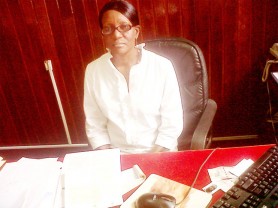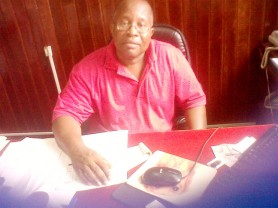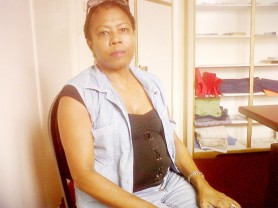Some four hundred involuntary re-migrants are now registered with the Juncata Juvant Friendly Society less than four years after it came into existence and according to its Vice-President Donna Snagg, while it has been growing in membership, resources remain a challenge.
At present the society which was set up in April of 2007 and provides assistance to persons who would have been deported has one major donor but the assistance may come to an end soon and Snagg said they are not sure about the source of further funding.

According to Snagg, herself an involuntary re-migrant and a founder member of the society, many of the persons who show up at their South Road office are very patriotic and want to help to build Guyana.
“These people come with skills, ninety percent of them are computer literate and they can help to build this country if they are not discriminated against. We try to get them into jobs and help them,” Snagg told Stabroek News in a recent interview.
And Snagg said that she has noticed a form of patriotism in the returnees who are eager to help Guyana and not inclined to criminality although some have unfairly stereotyped them in this regard.
“It is like they have found a new love and her name is Guyana,” Snagg said, adding that many of the persons do not consider re-migrating but instead are set on making this country their home.
Juncata assists its members in acquiring passports, driver’s licences, birth certificates and accommodation. Importantly the society provides counselling and assists with any social issues members may be facing, and some are even rehabilitated from substance abuse.
However, funding is not really forthcoming for accommodation and initially this is the need of the returnees as many have nowhere to live and this has forced some to take up residence on the streets. The office of the society is very small and Snagg said they are in need of a building of their own to effectively provide services to their members. Even as Stabroek News interviewed Snagg and her officers, persons kept streaming into the office, all seeking assistance and Snagg said on any given day this is normal.
“Our organisation is in dire need of funding, the support we are receiving right now we cannot predict how much longer it would last,” Snagg said.

While Snagg did not name the donor, earlier this year Stabroek News had reported that the society was one of the partners of the International Organisation for Migration (IOM) Guyana office which was providing US$2.8M to assist returnees in Guyana, Haiti and The Bahamas.
In addition to the society, IOM had also teamed up with the Institute of Private Enterprise Development (IPED) which was expected to provide the returnees with access to business management and entrepreneurship training and help in develo
ping a business plan. It was expected that some 250 persons would have benefitted not only from assistance to start up businesses but also with orientation sessions, a hygiene package on arrival, and most importantly support with temporary accommodation.
They were also to be assisted in obtaining a national identification card, counselling, rehabilitation from substance abuse, support in locating family members and assistance in accessing employment. The IOM programme was expected to come to an end in June this year and efforts to get a comment on the success of the programme were futile as National Project Officer of the IOM Guyana Office told Stabroek News that they were preparing reports and were not at liberty to speak.
From USA
However according to the society’s Human Resources Officer, Umar Saied, who is not an involuntary re-migrant, many of the persons who went into business are doing chicken rearing, farming, block making, selling food and clothing and some have gone into the interior to mine.

He explained that most of the persons registered with the society were returned to Guyana from the United States with a small percentage coming from Canada and an even smaller number from the Caribbean. He noted that while the society does not have the manpower to track the registered persons, on many occasions they would return to the society if they encounter problems and some would just come in to offer assistance to the society.
“Many of the persons who come to us are people who want to work and get a new start on life, they are not interested in committing any crime, they just want to make Guyana their home and move on,” Saied said.
He said persons should stop stereotyping the re-migrants and calling them deportees because of the stigma attached to the term even as he warned that with the rate of deportation soon “you might find every home have a person who was returned to Guyana.”
Saied, a former sergeant in the Guyana Defence Force, said most of the persons find jobs with security firms while others are hired as mechanics and carpenters and to demonstrate the level of service provided by some of the persons he gave the example of some men working at a major hotel. The management of the hotel was so impressed with their level of service that only on Thursday they requested twelve more security officers from the society.
“The stigma associated with people who are returned is just imposed and most of these people are hard working and honest people. Many of them don’t commit any violent crimes or anything – they might just be sent back for small infractions, and even if they were sent back for crimes they are ready to make a new start and should be allowed to do so,” Saied said.
Raymond Bovell, another founder member of the society, who was returned to Guyana five years ago after spending 17 years in the US, told Stabroek News that the society has assisted persons in even finding jobs at various ministries. Bovell, who holds a Bachelors Degree in business and has a paralegal degree, said that in his work at the society he tries to get the re-migrants to understand that Guyana is now their home and that there is life after deportation. He said he would take persons around to see the beauty of Guyana and he described this as a “process of re-socialisation” as many of the persons know nothing about Guyana as they would have left when they were young and had never returned previously.
“I assist them with counseling and employment preparedness and for them to apply for VAT certificates and skill certificates, get a driver’s licence and passport,” Bovell said.

‘Discriminated against’
Margaret Haynes, who left Guyana in 1976 at age 17 and was returned to Guyana three years ago for welfare fraud, has found it really hard here and most of all she misses her three children. She said while she has received counseling from the society she was hoping to obtain some financial assistance but in the end was “discriminated against.” The fifty-one-year-old former nursing assistant said that she has been told that the funding provided stipulates at present that only persons who entered Guyana from July of last year could receive any financial assistance.
“I feel like I am being discriminated against again, is like everywhere I turn I am being discriminated against, is like I can’t get my life up in Guyana,” the woman told Stabroek News. She said she would have liked to have some assistance acquiring items to sell, something she has already started doing through a little assistance from her children.
“When I come here to Guyana I was so confused, you know I was so hurt because I should not be deported – I didn’t really do anything criminal, it was a mistake I made, I did not file my income tax return in time when I was getting welfare assistance for my children. It is a human rights issue too because they are not supposed to separate me from my children,” the woman said.
She recalled that when she came to Guyana three years ago she was picked up by an in-law and was left at a house but she did not feel safe and eventually moved in with a male friend. That did not work out because the friend “wanted me to declare to the public I was his woman.” This led to her moving in with the landlord who later violated her. She later rented a room in the same building and the landlord moved in another male tenant in another room in the same apartment and the woman said she was again violated.
“I reported it to the police but his family begged me to drop the matter and because I had no one here, no family, I felt scared and I just drop the matter and move out,” the woman said.
“There is no opening for people like me,” the woman lamented while disclosing that she is now renting a room for $18,000 at an Atlantic Ville address but the roof leaks and this caused her electrical appliances, which her children had sent for her to sell, to be damaged. Her landlord refuses to replace the damaged items and she is refusing to pay her rent and this has caused her to be under tremendous stress.
“The place leaks and it does not have an escape route if something happens, it is only one door. I am scared every night, I feel like I am going to die in this country and I wouldn’t get to see my kids again,” the woman said.
The woman said she is being “discriminated against and victimized” by almost everyone, even the church she attends and close friends.
She is fighting to return to the US and while she has been granted an appeal the process has drained whatever little resources her children had and the case is now stalled.
Different story
For Ralph Turpin, also in his fifties, it is a different story as for the ten years he has been back he has been working on making Guyana his home and he is now enjoying life.
Turpin spent thirty years in America and during that time he was “totally indoctrinated with the US” and did not visit Guyana during that period. He said when he was deported he was picked up by an aunt from Eve Leary and told he could not stay with her but she had somewhere for him to live and that place turned out to be the Salvation Army Hostel.
Support from his family overseas made living at the hostel possible and life took a turn for the better shortly after. Turpin, a recovering addict at the time, would from time to time share his experiences with the men who were at the Salvation Army for rehabilitation and he was later asked by the administrator to get on board as a counselor. He worked at the Salvation Army for four years and later applied to the Phoenix Recovery Project and worked there for sometime before resigning and gaining a job at the Ministry of Health and he is also a counselor at the Juncata.
Soon Turpin in collaboration with other partners would open the doors of the Infinity Transitional House, which would support substance abusers and involuntary re-migrants. Turpin said he has travelled the length and breadth of Guyana due to his job and pointed out that the country is beautiful and all can work to develop it.
But it has not always been easy for Turpin and he recalled that initially the “days were long and the nights were short” and while in the US he was told he was a foreigner, in Guyana, still with his American accent, he was told the same thing.
“I felt like a man without a country,” he told Stabroek News recently but added that the term deportee does not bother him. He urged that they be given a chance in Guyana because “we are as educated and qualified as others and can make a contribution. I am a college graduate.”
“I shudder to think what would have happened to me if I did not have family support,” Turpin said.
He pointed out that many persons usually say that deportees got a chance to travel and they messed up and as such should not be assisted “but I would say he without sin cast the first stone. ” Turpin said returnees are not “a liability to this country” as they have experience and skills in many professions that can benefit Guyana.
“Had I known what I know now I would have came back to Guyana a long time ago,” Turpin said with a smile, adding that as a counselor the majority of the people he counsels at Juncata do not have a problem with drugs but rather with acquiring the basic necessities such as housing and they also have relationship and employment issues.
To make contact with Juncata Juvant (Latin for ‘things joined together are helpful’) Friendly Society persons can call 225-8303 and 225-8309 and its website address is juncatajuvant.org.gy.




